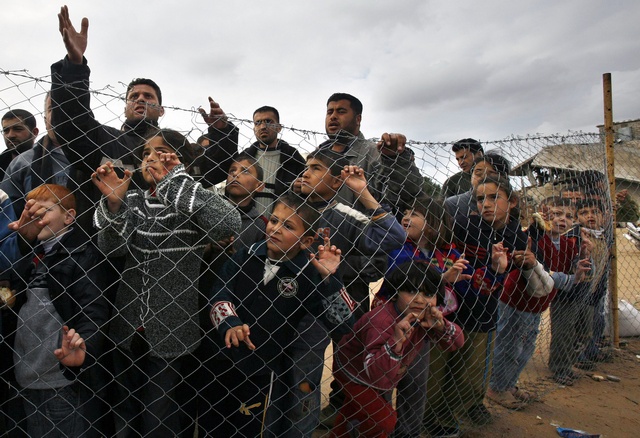GAZA兵器と人間・資料庫 @ wiki
Israel/Gaza: Donors Should Press Israel to End Blockade
最終更新:
pipopipo777
-
view
Israel/Gaza: Donors Should Press Israel to End Blockade
Access Required for Successful Reconstruction
ガザ:資金援助国は封鎖を止めるようイスラエルに圧力をかけるべきです
成功する復興にはアクセスが必要です
March 1, 2009
ガザ:資金援助国は封鎖を止めるようイスラエルに圧力をかけるべきです
成功する復興にはアクセスが必要です
March 1, 2009
Internally displaced Palestinians wait to receive food supplies in Jabaliya on February 22, 2009.
© 2009 Reuters
© 2009 Reuters
(Jerusalem) - International donors to Gaza's reconstruction and development should call on Israel to end its punishing blockade of the territory and to allow needed humanitarian assistance and normal commerce to resume, Human Rights Watch said today. Even after the enormous war damage to civilian life in Gaza, Israel continues to block desperately needed aid from entering the territory and to strangle Gaza's economy.
(エルサレム) - ガザの再建と開発への国際ドナー(資金援助国)は、イスラエルが、制裁封鎖を終わらせて必要な人道援助と通常の商業が再開するのを許容するよう要求すべきです、とヒューマン・ライツ・ウオッチは、今日、言いました。 ガザの一般市民の生活への莫大な戦災の後にさえ、イスラエルは、必要な援助が領土に入るのを妨げて、ガザの経済を絶望的に締めつけ続けています。
Representatives of prospective donor countries are convening in the Egyptian Sinai resort town of Sharm al-Sheikh on March 2, 2009, for a one-day conference. Human Rights Watch said that ending the blockade was absolutely critical to any prospects for reconstruction and economic recovery. Among those attending will be the US secretary of state, Hillary Clinton, and the EU high representative for common foreign and security policy, Javier Solana.
援助国となる予定の国々代表は、2009年3月2日にSharmアル-シェイクのエジプトのシナイ観光都市、Sharm al-Sheikh に、1日の会議のために召集されました。 ヒューマン・ライツ・ウオッチは、封鎖を終わらせるのが再建と景気回復のどんな見通しにも絶対的に重要であると言いました。 出席者の中には、米国国務長官ヒラリー・クリントン、EUの外交安全保障政策委員会上級代表ハビエル・ソラナが予定されています。
"All the pledges of aid this conference is expected to produce will be worth next to nothing if the donors do not demand that Israel open the borders to commercial goods as well as humanitarian essentials," said Kenneth Roth, executive director of Human Rights Watch. "This unlawful blockade is the primary impediment to reconstruction and to the economic activity that is essential to any society."
「もし援助国が、人道主義の基礎として商品のために国境を開くことをイスラエルに要求しないならば、この会議で起こそうともくろむ援助のすべての誓約の価値を、無にしてしまうでしょう。」と、ヒューマン・ライツ・ウオッチのシニアディレクターであるケネス・ロスは言いました。「この不法な封鎖は、再建にとっても、そして、どんな社会にも不可欠な経済活動にとっても第一の障害です。」
Israel effectively controls Gaza's borders and airspace. Human Rights Watch said that the blockade, which has been in place since June 2007, after Hamas took control of Gaza, amounts to collective punishment of the civilian population, a serious violation of international humanitarian law. Israeli restrictions on the entry of goods should be strictly limited to weapons and items whose direct military potential clearly outweigh their civilian usage.
事実上、イスラエルはガザの境界と領空を支配してます。 ヒューマン・ライツ・ウオッチは、ハマスがガザを制御した後の2007年6月以来の封鎖が、国際人道法の重大な違反である一般市民への集団的処罰に達すると言いました。 貨物通関のイスラエルによる制限は、兵器と、直接的戦力寄与が明きらかに民生需要より重い品目に、厳密に限られるべきです。
According to the United Nations, Gaza needs a minimum of 500 truckloads of humanitarian aid and commercial goods every day. Israeli authorities have told humanitarian agencies that they would allow up to 150 truckloads a day. However, the actual number has not exceeded 120, according to the UN Office for the Coordination of Humanitarian Affairs (OCHA). The average in February has only been between 88 and 104, including grain shipped by conveyor belt at the Karni crossing.
国連によれば、ガザは人道救助と商品の最低トラック500台分を毎日必要とします。 イスラエル当局は、1日あたり最大トラック150台分を許容すると人道主義機関に言いました。 しかしながら、国連人道問題調整事務所(OCHA)によれば、実数は120台分を超えていません。 2月の平均は、88~104台分であるにすぎなかったのです、カルニ検問所のコンベヤベルトによって出荷された穀物がそれに含まれます。
Aid workers with operations in Gaza told Human Rights Watch that Israeli procedures since major hostilities ceased were making it virtually impossible to plan for aid deliveries more than 24 hours in advance. On several occasions Israeli authorities refused to allow passage of pre-scheduled aid shipments hours before they were supposed to arrive, they said.
主要な戦闘がやんでからも、イスラエルの手続きは24時間以上前に援助配送の計画を立てるのを実際に不可能にした、とガザにいる支援スタッフはヒューマン・ライツ・ウオッチに言いました。時折イスラエル当局は、予定済みの援助出荷の通過を、到着する何時間か前になって許容するのを拒否しました、と彼らは言いました。
Israel continues to block goods on trucks from entering Karni, the one border crossing point with sophisticated security screening equipment and the capacity to handle up to 750 trucks per day. Sufa crossing, which can also accommodate trucks on a smaller scale, also remains closed. Instead, Israel requires all trucks to enter through Kerem Shalom, located near Gaza's southern tip, where every item on trucks must be unloaded, inspected, repackaged and reloaded, with a "handling fee" of US$1,000 per truck.
イスラエルは、高性能のセキュリティスクリーンを備え、一日あたり750台の処理が可能な国境検問所であるカルニに、トラックの商品が入るのを妨げ続けています。Sufa検問所は、いくらか小規模ながら同様にトラックを処理できるにかかわらず、閉ざされたままです。代わりに、イスラエルは全てのトラックに、ほぼガザの南端に位置するKerem Shalomを通過して入ることを要求し、そこでは、1トラックあたり1,000USドルの「取扱費」を払いながら、トラック上のあらゆる商品を降ろして、点検して、包装し直して、再び積まなければなりません。
In the weeks since heavy fighting ceased on January 18, Israel has arbitrarily refused entry to items like chickpeas, macaroni, wheat flour, notebooks for students, freezer appliances, generators and water pumps, and cooking gas, OCHA said.
重い戦いが1月18日にやんで以来の数週間、イスラエルは身勝手にも、ヒヨコマメ、マカロニ、小麦粉、学生のためのノート、冷凍器具、発電機、ウォータポンプ、および料理ガスのような品目の入国すら拒否しています、と国連人道問題調整事務所OCHAは言いました。
Human Rights Watch researchers in Gaza observed several areas - including eastern Jabalya (Izbt Abd Rabbo neighborhood), Juhr al-Dik, Khuza`a, and al-Atatra - that had suffered extensive damage to homes and civilian objects during Israeli military operations that began on December 27, 2008. Across Gaza, researchers observed the wide-scale destruction of greenhouses and agricultural land, destroyed factories, a hospital burned by fire from white phosphorus shells, and the bombed Ministry of Justice building.
ガザのヒューマン・ライツ・ウオッチの調査員はいくつかの地域を観測しました--Izbt Abd Rabboの近所である東Jabalya、Juhrアル-Dik、Khuza'a、およびal-Atatra(2008年12月27日に始まったイスラエルの軍事作戦の間に家と家財への甚大な損害を受けていた)を含んでいます。 調査員はガザを横断して広範なスケールの破壊を観測しました。温室と農地、破壊された工場、白リン弾からの炎で燃えた病院、および爆撃を受けた法務省ビル。
In total, the United Nations Development Program (UNDP) estimates that the fighting in December and January damaged or destroyed 14,000 homes, 219 factories, 240 schools, and 31 nongovernmental organizations. Gaza's electricity generator sustained US $10 million in damage, and the water utility $6 million.
12月、1月の戦いが、合計で1万4000の家、219の工場、240の学校、および31非政府団体を破損したか破壊したと、国連開発計画(UNDP)は見積もっています。 ガザの発電機は1000万米ドル、および水道設備は600万ドルの損害を受けました。
Restrictions on humanitarian aid and commerce need to be targeted, and not so broad as to block the movement of ordinary civilian goods, Human Rights Watch said. Israel has provided no security or other justification for its refusal to allow goods to enter or leave Gaza via the Karni crossing, or for its strict limits on what is allowed in and in what quantities. Nor has Israel provided any security rationale for its complete ban on any exports from Gaza for more than a year, with the exception of a one-time shipment of flowers to Europe in mid-February.
人道援助と商品の制限は、非難の対象にする必要があり、日常の民間物資の流通を妨げるほど広げてはならない、とヒューマン・ライツ・ウオッチは言いました。 カルニ検問所を通るガザの商品の輸出入の許可を拒否することに対して、また、何が許可され、どれだけ許可されるかについての厳しい制限に対して、イスラエルは何の安全保障も他の正当性も規定しませんでした。2月中旬のたった1回のヨーロッパへの花の出荷を除くと1年間以上続いた、ガザからの完全輸出禁止令に対しても、イスラエルは何ら安全保障論拠を規定しませんでした。
"If Gaza business people can ship one truckload of flowers for Valentine's Day, why can't they export flowers, or strawberries and oranges, every day?" Roth said. "Israel's blockade policy can be summed up in one word and it is punishment, not security."
「もしガザの実業家がバレンタインデーのときにトラック一台の花を出荷できるというなら、かれらはなぜ毎日、花やイチゴやオレンジを輸出できないのでしょうか?」 とロスは言いました。 「イスラエルの封鎖政策を一言でまとめることができます、それは安全保障ではなく、罰です。」
添付ファイル

